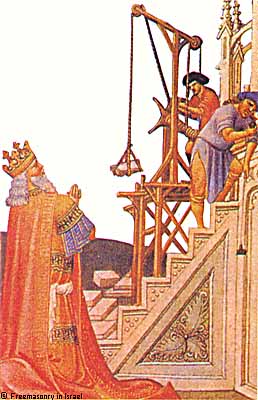

 Freemasonry in Israel
Freemasonry in Israel


 Freemasonry in Israel
Freemasonry in Israel
 Freemasonry in Israel > Articles > Philosophy > Some Judaic Aspects of Freemasonry
Freemasonry in Israel > Articles > Philosophy > Some Judaic Aspects of Freemasonry
Some Judaic Aspects of Freemasonry
Yasha Beresiner
Master, Quatuor Coronati Lodge #2076, UGLE
Reprinted from The Israeli Freemason

Considering how frequently our ritual repeats the Craft's close connections with King Solomon and his Temple, it is not surprising to find Freemasonry so closely equated to Judaism, among the uninitiated particularly. It is all the more ironic, therefore, that Jews would have had to have been excluded by our Masonic forbearers because of the very nature of the early charges. The preamble to each begins with a prayer to '... the Father of Heaven, the Glorious Son ...'. Without wishing to be embroiled in the debate as to our origins, the charges may be described as the founding documents, so to speak, of modern speculative Freemasonry. They were the rules and regulations by which operative Masonic Lodges governed their affairs. The earliest known is the Regius Manuscript, now in the British Museum and dated 1390. Over one hundred such charges written during the following four Centuries have been found and studied as a source, if nothing else, of the inspiration for our beginnings.
When the premier Grand Lodge was formed in England in 1717, there were estimated to be just 1000 Jews in England. Their involvement in Freemasonry would in any case have been limited. Laurence Dermott, that most remarkable Freemason and secretary of the 'Antients' Grand Lodge formed in 1751, was also critical of the premier Grand Lodge for allowing the 'de-Christianization' of the Craft. It is here that we come to one of the more intriguing aspects of Judaism in Freemasonry; namely the publication in 1756, of the first book of the Antients Grand Lodge, with the unusual Hebrew Title 'Ahiman Rezon'. For over two hundred years, scholars have puzzled on the meaning of 'Ahiman Rezon' and even more importantly, as to why Laurence Dermott chose a Hebrew title for the Constitutions of the Antients. Was he not himself, after all, adverse to Jewish involvement in Freemasonry?
There are, on the other hand, a few more curious facts. These same Constitutions expressly state on the title page '... with prayers for Jews ...'. Could this have been an attempt by the Antients Grand Lodge to gain greater membership in the light, possibly of the increasing competition with the premier Grand Lodge of England? Even before the Constitutions were published, the very first minutes of the Antients Grand Lodge meetings of December 1751 are signed by Laurence Dermott as Grand Secretary ... in Hebrew, followed by the word 'Sofer' (pronounced Soh-fehr, in Hebrew: Torah scribe, author) also in the Hebrew alphabet. This is usually explained as Dermott expressing, if not demonstrating his scholarly status, which included a good knowledge of the Hebrew language. The Quatuor Coronati Lodge of Research in London has had several papers presented and published in its transactions, Ars Quatuor Coronatorum, on the subject. The definitive answer about 'Ahiman Rezon' and Dermott's interest in Judaism still eludes us.
See also:
Copyright © 1997- Freemasonry in Israel. All rights reserved. • Valid XHTML, CSS, WAI, Unicode.
Reproduction, distribution, or publication of any part of this web site, in any form or by any means, constitute infringement of copyright laws.
This web site is NOT the official site, statement, or opinion of any Grand Lodge, Lodge, or individual. All contributions are voluntary and represent only good intention and effort.